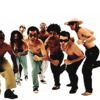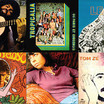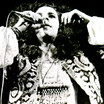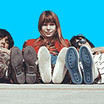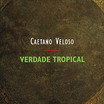Eubioticamente atraídos
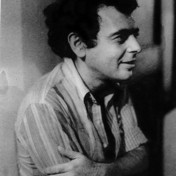
tropicalism, anthropophagy, myth, ideogram
Tropicalist verb
TROPICALISM, ANTHROPOPHAGY, MYTH, IDEOGRAM (1969)
Glauber Rocha
Published in Revolução do Cinema Novo. Rio de Janeiro: Alhama, 1981.
In 1922 a revolution against academic and official culture began in Brazil. Oswald de Andrade, the main proponent for change during this time, defined his cultural activism and his work, which is truly brilliant, as anthropophagic. Refering to the tradition of anthropophagic Indians, he said that since they had eaten white men, they had eaten all Brazilian and colonial culture. Very few of his works were published during his lifetime.
José Celso Martinez Corrêa, who directs the Oficina Theater -the most import avant-garde theater group in Brazil- discovered Andrade’s The Candle King and staged it. It was truly a revolution: anthropophagy (or Tropicalism as it is also called) presented for the first time to a Brazilian audience sparked a great cultural awakening.
The development of Tropicalism and anthropophagy is the most important thing in Brazilian culture today.
The history of Brazil is short and truncated. We have a national-fascist tradition that later became national democratic, but when the country became aware of its underdevelopment, utopian nationalism experienced a crisis and fell apart. First economic underdevelopment was noted, although in a quite schematic way since the social sciences in Brazil are outmoded; later carne the realization that underdevelopment was total. From its Start, Brazilian cinema understood this totality and the necessity of overcoming it completely -aestheticaIly, philosophicaIly, economicaIly -overcoming underdevelopment through means that are typicaI of underdevelopment. Tropicalism, the anthropophagic discovery, was a revelation: it raised consciousness, altering attitudes about colonial culture. It didn’t reject Western culture as in the beginning (which was crazy because we lack a methodology); Tropicalists accepts the total ricezione (receptivity), the ingestion of core methods of a complete and complex culture, and its transformation through nostri succhi (our digestive system) and the utilization and elaboratin of correct politics. With this discovery, the search for a new aesthetic, which is a new phenomenon, emerged.
Now “Tropicalism” is a name that, like cinema novo, means nothing. What is meaningful is the apporto (contribution) of artists in this direction.
Tropicalism is the acceptance, the rise of underdevelopment; therefore, the is a clear distinction between cinema before and after Tropicalism. Now we aren’t afraid to confront Brazilian reality, our reality, and all its meanings and depths. This acceptance is indicated by the anthropophagic relationships among characters: the professor eats Antônio, Antônio eats the cangaceiro (backland bandit), Laura eats the commissioner, the professor eats Claudia, the murderers eat the people, the professor eats the cangaceiro. The anthropophagic relation is freedom.
I should have done things this way in Deus e o Diabo (Black God, White Devil), but the characters’ relationships were closed since they censored each other; they were more bourgeois because I was more bourgeois. In contrast, in directors: this freedom, which is new for us, created the possibility for a new relationship with the public.
Lately we haven ‘t been making North American films or populist films: I think that this kind of cinema is less conceptual (and for this reason,less schematic) and penetrates more deeplya colonized public like ours. We can’t compete with the imperialist system, but if films are made that directly reach.the conective unconscious, the most true and deep disposition of a people, then we might even win.
On the other hand, winning wasn’t something planned, it was a result of growth. And we will still make ugly films. But what counts is the audience, and the audience is segmented.
It is an aesthetic-political search that operates under the sign of individualization and the conective unconscious and for this reason we make critical use of familiar forms of popular culture.
I recently spoke with Godard about the place of political film. Godard believes that in Brazil we have an ideal situation to create revolutionary film, but instead we stil make revisionist films, in sum, films that privilege drama and the development of the spectacle.
According to him, today there is a cinema for four thousand people, primarily activists. I understand Godard. For a European, French filmmaker it’s logical to put forward the problem of destroying cinema. But we can’t destroy that which does not exist. And to put a sectarian problem in these terms is therefore wrong. We’re going through a phase of national liberation that also involves cinema so the relationship with a mass audience is fundamental. Having nothing to destroy, we only construct. Cinemas, houses, roads, schools, etc.
Godard finally understood, and I participated as an actor in a scene of his film, which I believe in. A structural inversion in the Western genre could be very interesting and useful for us. The Western is important, not just for me. We are a people historically linked to the saga, to the epic. We do not have a grand philosophical tradition, which is bad. But an imported philosophy that doesn’t relate to our history would be worse. For this reason, anthropophagy is even more important.
We can create the traditions of an industry in which the producer is the author. Today, among us, the role of the producer is one of a technician who studies the market in order to find objectively economic methods and solutions in order to arrive at planning models.
There is a Brazilian cinema that didn ‘t exist before and at its core there are a lot of differences.
We had to build the structures and discover the fi1mmakers. This was done. Now there is a change in tactics that involves a great deal of work (planning, organization) in order to disseminate the possibilities of cinema.
To speak about language and myth is of fundamental importance. It’s the core of our problem. If we are moving toward total global revolution, language must be understood in the Marxist sense, as an expression of consciousness.
For us the problem is more immediately understood, because illiteracy leads to a type of complex perception and we want to develop our cinema in a permanent historical dialectic with the current situation.
There were various phases. The moment of social protest, influenced by neo-realism and North American social cinema. The moment of revolutionary euphoria that already had limited and schematic popular characteristics. FinalIy, the moment of reflection, meditation, and deep searching.
In these three moments we find big differences in terms of language, even in a single author. For example, at this moment am less influenced by other people. Antonio das Mortes has less rubbish. The influences are more subjective, more intimate.
The cinema of the future is ideogrammatic. It involves a difficult research about signs (symbols). Science is not enough for this, but we need a process of knowledge and self. knowledge that permeates alI of existence and its integration into reality.
The myth is the primary ideogram and it serves us; we need it to lrnow ourselves and to know. Mythology, any mythology, is ideogrammatic, and the fundamental forms of cultural and artistic expression refer to them continualIy. Later we can develop other things, but this is a fundamental step. Surrealism, for the Latin American people, is Tropicalism.
There is a surrealism that is French and another one that is not Between Breton and Salvador Dali there is an abyss. Surrealism is a Latin thing. Lautréamont was Uruguayan and the first surrealist was Cervantes. Neruda speaks of concrete surrealism. It’s the discourse of the relation between hunger and mysticism. Ours is not the surrealism of dreams, but of reality. Buñuel is a surrealist and his Mexican film are the first Tropicalist and anthropophagic films.
The historic function of surrealism in the oppressed Hispanic-American world was to be na instrument of thought toward anarchic liberation, the only kind possible. It can be used dialectically today with deep political meaning to promote Clarity and dissent. Ideogrammatic cinema is the following: a developed and explored form of consciousness, consciouness itself, in direct relation to the production of revolutionary conditions. The intelligence of French criticism, although snobbish and sometimes academic, has saved cinema from even greater mediocrity. What messed up Italian cinema was pseudo-marxist criticism. Bazin is much more intelligent than Guido Aristarco, althoug Rossellini, Visconyi, Fellini, Antonioni are Italians. The escellent criticism of Bazin only influenced Godard, although Truffaut could be a great filmmaker if he would undergo psychoanalysis. Two French filmmakers that I follow with interest: Resnais and Jacques Rivette. But as long as French cinema stays in the realm of reason, it will be limited. And what is worse is that this reason is antidialectic. Godard is Swiss -an underdeveloped man smashed by his neighboring country. And he is Protestant -a timid moralist that blows himself up so as not to die offear.
1 Glauber participated in the filme Vent d’Est (Eastem Wind) (1969) byJean-Luc Godard. He made a key intervention in a scene that addressed the development of third world cinema which bis French friend did not appreciate because his speech proposed, as an imperative of revolutionary cinema, the creation of national anti-imperialist cinemas in various third world countries (inspired by Guevara’s proposal to create as many Vietnams as possible).












